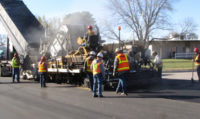Colombia is currently working to develop more than a dozen major infrastructure projects worth more than $5.5 billion. In addition, the Transportation Ministry is moving forward with efforts to construct and revitalize existing highways, seaports, airports, railroads and waterways. Transportation Minister Andres Uriel is President Alvaro Uribe�s point man in this ambitious undertaking.
 |
| Andres Uriel (Photo courtesy of Colombian Ministry of Transportation) |
Uriel became Colombia�s Minister of Transportation in 2002 when he was named to the post by Uribe, the country�s newly elected. A longtime friend of the president, Uriel served as the Secretary of Public Works in the state of Antioquia between 1995 and 1998 when Uribe was governor there. Uriel graduated from the National University of Colombia with a degree in civil engineering and later obtained a postgraduate degree in structures from the university. He has served on the civil engineering faculty at the National University and has taught labor practices at various universities in Colombia.
One major project is Plan 2500, the largest infrastructure overhaul in the country's history. The project involves the restoration of more than 3,200 kilometers of roadway and hundreds of bridges and will cost more than $770 million. It�s a critical effort in a country that has only 400 kilometers of paved double-lane highway. ENR recently interviewed Uriel.
What are the main transportation infrastructure projects in Colombia right now? The El Dorado airport expansion is a key project because the ability of the entire central region to be competitive depends on it. It is both for passengers and cargo and its location is the best in the world so the international trade is closely tied to its improvement. This is a vital project for the economic development for the region. Other vital projects are the port expansions such as with the Malaga Bay port and the improvement of the railway particularly for the transport of coal. These improvements make expanding the arterial roadway system through Project 2500 indispensable.
Why has the development of Colombia�s infrastructure, particularly the transportation infrastructure, been neglected in the past? Economic limitations of the fiscal resources. Colombia has delayed investment in many sectors, not just infrastructure. Other economic and fiscal sectors have had a higher priority. We have had to use our fiscal resourses to pay the external debt, social investment, health and education, physical investment, basic sanitation, potable water and transportation infrastructure. In addition, there has been considerable expense for the threat of terrorism that requires a large investment in defense and security.
|
Why has this become a priority now? If there is no infrastructure, there is no development. Infrastructure is needed first and investment in infrastructure. It will generate dynamic economic productivity, employment and better quality of life. The economy is beginning the process of globalization and without competition we will have problems in the future to continue economic growth. We have been slow in investing in this sector; we have to undo this trend and put more fiscal effort behind it.
The World Bank recommends that developing countries dedicate at least 1.5 percent of their Gross Domestic Product to transportation infrastructure development. Colombia has fallen short of that for many years. Do these projects change that trend? These projects put us almost at the level of 2 percent annually. We are doing all of this with public and private investments but if we include every aspect of infrastructure currently being done, Colombia is now exceeding 2 percent.
What are the primary obstacles Colombia faces in moving forward with these projects? We have to establish an appropriate equation of the risks � the financial risks, the geologic risks, the security risks and the operations risks. And we have to balance that with a fifth risk, the environmental risk, to establish an appropriate measure in order to balance all the various risks.
How does the ongoing civil war affect infrastructure development efforts? The internal conflict does not have a major effect on the execution of works except in regions away from the capital. There you find some problems but along the main transportation corridors it is less. Where the conflict exists it requires better monitoring and increased security over all the bridges. What we have seen is that there is an increase in confidence concerning Colombia among foreign investors due to the reduction of the levels of risk here.
Do you expect the upcoming Presidential election will disrupt these efforts? We are making plans for the next four years without respect to the election. These plans are not for [Uribe�s] re-election. There is no real effect because we are developing projects with this government and will put them out to bid by the end of the term.

What is being done to ensure these projects will continue beyond Uribe�s presidency? With long-term infrastructure development efforts we must have continuity across different governments. There has to be continuity in development projects across different administrations so that is why we are establishing Vision 2019 plan to act as a plan to extend into the next governments.
What types of financing are being used in these projects? With direct contracts there is the option of multilateral bank credit. There is also a concession system that allows us to use future funds to build works now and pay for them later.
What is Colombia doing to attract more interest, particularly investment interest, in these works? We are establishing networks, we are constantly in discussions, we are constantly in contact with our diplomatic missions about projects and we are successfully receiving help. International construction companies are constantly looking for opportunities in other countries where they participate in bids and investments. We are taking care of those businesses and showing them to the levels of the projects and the constant reduction in risks.


Post a comment to this article
Report Abusive Comment